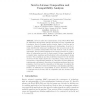Free Online Productivity Tools
i2Speak
i2Symbol
i2OCR
iTex2Img
iWeb2Print
iWeb2Shot
i2Type
iPdf2Split
iPdf2Merge
i2Bopomofo
i2Arabic
i2Style
i2Image
i2PDF
iLatex2Rtf
Sci2ools
ICSOC
2007
Springer
2007
Springer
Service License Composition and Compatibility Analysis
Services enable the transformation of the World Wide Web as distributed interoperable systems interacting beyond organizational boundaries. Service licensing enables broader usage of services and a means for designing business strategies and relationships. A service license describes the terms and conditions for the use and access of the service in a machine interpretable way that services could be able to understand. Service-based applications are largely grounded on composition of independent services. In that scenario, license compatibility is a complex issue, requiring careful attention before attempting to merge licenses. The permissions and the prohibitions imposed by the licenses of services would deeply impact the composition. Thus, service licensing requires a comprehensive analysis on composition of these rights and requirements conforming to the nature of operations performed and compensation of services used in composition. In this paper, we analyze the compatibility of ser...
Related Content
| Added | 08 Jun 2010 |
| Updated | 08 Jun 2010 |
| Type | Conference |
| Year | 2007 |
| Where | ICSOC |
| Authors | G. R. Gangadharan, Michael Weiss, Vincenzo D'Andrea, Renato Iannella |
Comments (0)

